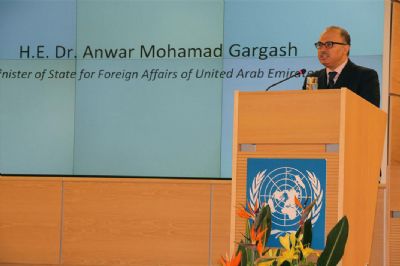At the Council, Gargash also fashioned his country as a champion of women's rights and human rights more generally. His worlds included: "The UAE is deeply committed to promoting respect for human rights and fundamental freedoms...Islam [is] a religion which is conducive to modernization, tolerance and women's empowerment...we see the empowerment of women as fundamental for our development."
Actually, this is how the UAE is promoting "respect for human rights" and the "empowerment of women", according to the 2013 State Department report:
- "The three most significant human rights problems were citizens' inability to change their government; limitations on citizens' civil liberties (including the freedoms of speech, press, assembly, association, and internet use); and arbitrary arrests, incommunicado detentions, and lengthy pretrial detentions... The penal code allows men to use physical means, including violence, at their discretion against female and minor family members...Domestic abuse against women, including spousal abuse, remained a problem.... In sharia courts... the extremely high burden of proof for a rape case contributed to a low conviction rate. In addition, female victims of rape or other sexual crimes faced the possibility of prosecution for consensual sex instead of receiving assistance from government authorities... The law permits a man to have as many as four wives. Women normally inherited less than men under the government's interpretation of sharia....For a woman to obtain a divorce with a financial settlement, she must prove that her husband had inflicted physical or moral harm upon her, had abandoned her for at least three months, or had not maintained her upkeep or that of their children... The government may imprison and deport noncitizen women if they bear children out of wedlock...Paternity denial was an emerging phenomenon in the courts...In the absence of an acknowledged father, the mothers of these children faced potential legal charges of adultery, for which the punishment can be lashing... Under sharia individuals who engage in consensual same-sex sexual conduct are subject to the death penalty."

